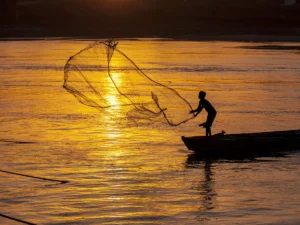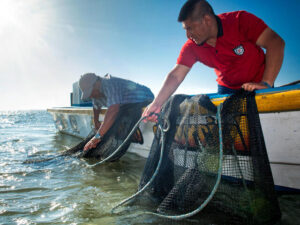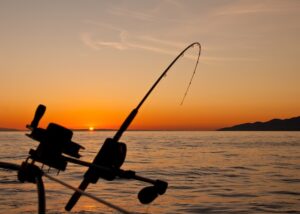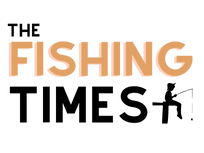Fishing has been a popular pastime and a means of livelihood for centuries. However, as the world’s population grows, the demand for fish increases, and the number of fish in the oceans and rivers is declining. Overfishing has become a major problem, and it is more important than ever to practice responsible fishing. In this article, we will discuss fishing ethics and how to practice responsible fishing in 2023.
What are Fishing Ethics?
Fishing ethics are a set of principles and values that guide the behaviour of anglers when they are fishing. It includes the proper treatment of fish, the conservation of the environment, and the responsibility of anglers to ensure that fishing practices are sustainable. Fishing ethics are based on the idea that anglers have a responsibility to act in a manner that is respectful to the environment, the fish, and other anglers.
How to Practice Responsible Fishing in 2023
Follow Catch Limits and Regulations
The first step in responsible fishing is to follow catch limits and regulations. Every region has its own rules and regulations for fishing, and it is important to know and understand these rules before heading out on the water. Catch limits are put in place to ensure that fish populations remain healthy and sustainable, and it is important to respect these limits. Additionally, anglers should always follow regulations related to gear, size limits, and season closures to ensure that they are not unintentionally harming the environment or the fish populations.

Practice Catch and Release
Catch and release is a fishing technique that involves catching a fish and then releasing it back into the water unharmed. This technique is a great way to enjoy the sport of fishing while also protecting fish populations. When practicing catch and release, anglers should use barbless hooks to minimize injury to the fish and should handle the fish gently to avoid damaging its scales or fins. It is also important to release the fish quickly to minimize stress.
Use Ethical Fishing Gear
Anglers should also use ethical fishing gear when fishing. This means using gear that is designed to minimize harm to fish and the environment. For example, using circle hooks instead of J-hooks can reduce the likelihood of deep hooking, which can lead to injury or death for the fish. Additionally, using biodegradable fishing line and lead-free weights can reduce the impact of fishing on the environment.
Respect Other Anglers and the Environment
Anglers should always respect other anglers and the environment when fishing. This means avoiding crowded fishing spots, cleaning up after yourself, and avoiding littering. Anglers should also avoid fishing in protected areas and should be mindful of their impact on the environment. Additionally, anglers should be respectful of other anglers and their fishing techniques, and should always be willing to share the water and help others when needed.
Educate Others
Finally, anglers should take the time to educate others about responsible fishing. This can include sharing information about catch limits and regulations, demonstrating catch and release techniques, and discussing ethical fishing gear. Additionally, anglers can help to promote sustainable fishing practices by supporting organizations that work to protect fish populations and the environment.
It is important to remember that responsible fishing is not just a personal responsibility but a collective one. Everyone who enjoys fishing has a role to play in protecting fish populations and the environment. In recent years, there has been a growing movement towards sustainable fishing practices, and many organizations are working to promote responsible fishing around the world.

One of the most important things that anglers can do is to stay informed about changes in fishing regulations and other issues that affect fish populations. This can be done by following local news and organizations that promote sustainable fishing practices. Many fishing clubs and organizations also offer educational programs and workshops that can help anglers learn more about responsible fishing.
Another way that anglers can promote responsible fishing is by supporting organizations that work to protect fish populations and the environment. This can be done by volunteering, making donations, or simply spreading the word about these organizations to others. There are many organizations that focus on protecting specific species of fish or specific regions, and supporting these organizations can help to ensure that these fish populations are preserved for future generations.
Finally, anglers should also be willing to make changes to their own fishing practices in order to promote responsible fishing. This may mean using different gear, fishing in different areas, or practicing different techniques. By being open to change and willing to try new things, anglers can help to ensure that fishing remains a sustainable and enjoyable activity for years to come.
Moreover, technology has also played a significant role in promoting responsible fishing. Anglers can now use mobile apps and websites to access information about fishing regulations, catch limits, and other important information. These resources can help anglers to stay informed about changes in fishing regulations and make sure that they are following the latest guidelines.

In addition, technology has also led to the development of new fishing gear that is designed to minimize harm to fish and the environment. For example, there are now biodegradable fishing lines that break down over time, reducing the risk of entanglement and injury to fish and other marine life. There are also lead-free weights that reduce the impact of fishing on the environment and help to protect fish populations.
It is also worth mentioning that responsible fishing is not just about protecting fish populations and the environment. It is also about respecting the cultural and spiritual significance of fishing for many communities around the world. For some people, fishing is not just a hobby or a means of livelihood, but a way of life that has been passed down from generation to generation. It is important to recognize and respect these cultural traditions and to work with these communities to promote sustainable fishing practices.
In conclusion, responsible fishing is a collective responsibility that requires anglers to act in a manner that is respectful to the environment, the fish, and other anglers. By following catch limits and regulations, practicing catch and release, using ethical fishing gear, respecting other anglers and the environment, educating others, supporting organizations that promote sustainable fishing practices, and being open to change, anglers can help to protect fish populations and the environment. It is up to each and every one of us to do our part to ensure that fishing remains a sustainable and enjoyable activity for generations to come.












